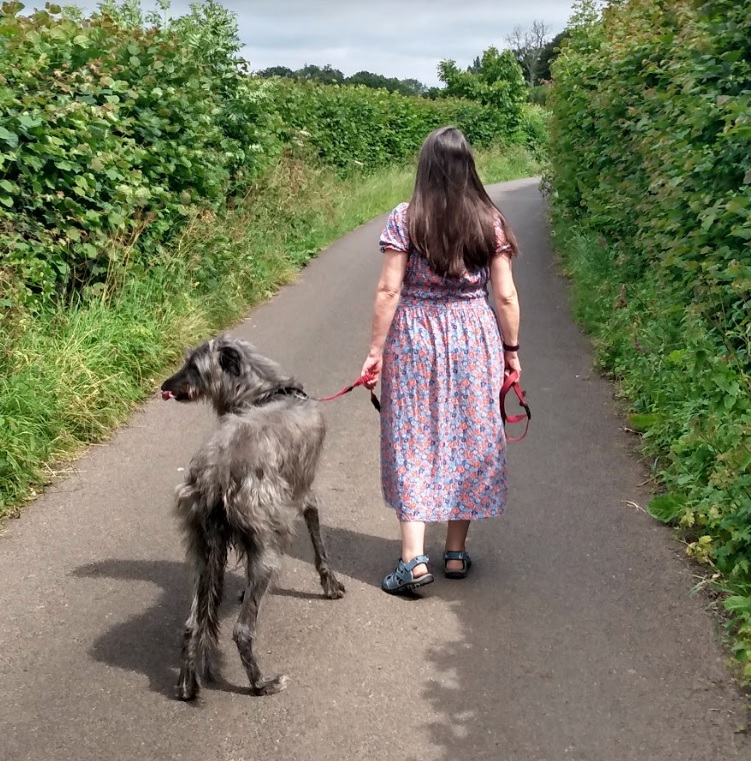
Background
As a child, I learnt piano for 2 years, but dropped it as soon as I could. I learnt the recorder and can still belt out the Skye Boat song when needed. My husband plays the guitar a little, but is not one for sing alongs. The only musical member of my family was my Grandfather who taught himself to play the piano and played very well. Each year, he would play Happy Birthday down the phone. I didn’t realise how much I looked forward to it, until after his death. The music stopped.
Then the children arrived. As toddlers, I took them once a week to Music and Play. Their wonderful childminder is musical, so their time with her was filled with music. Real music. She would sing and play instruments with them. Friends would visit and play too. Piano, clarinet, guitar and probably more.
Next, school started. They returned clutching letters inviting them to learn instruments. Such variety. Eldest started off with keyboard, tried clarinet and then onto harp. She has now switched from keyboard to piano. She has taken her grade one harp and wants to do more. Middling is learning piano and I often find her practising. She also does singing lessons. We give them music lessons as Christmas and Birthday presents, making a gift that lasts all year.
Sometimes, I hear the girls practising duets together. I cannot begin to tell you how much I love hearing them both make real music in the house. There are stages when they won’t practise, but then something happens and they are practising almost every day. So many times I will find all three of them playing together with the keyboard at the centre of their play. One will play and another dances. Musical statues or adding music to accompany their story telling.

How we do music
Soon it will be the turn of youngest to choose an instrument. He brought his letter back today. He would like to learn the drums or guitar. We’ll see. We have been blessed with wonderful music teachers and I put a lot of the children’s love for music down to these people, but as a parent we also have a role. In the last seven years, I have learnt what works and what doesn’t. I’m going to include a list of 10 things that we did, as non-musical parents, to help – apart from paying for the lessons – which may help other non-playing parents:
To start
- You too must like the instrument they choose. After all, you will be listening to them practise.
- If you find a musical workshop where they can try out different instruments, then go as a family.
- Find a teacher that you both like. Being able to talk to the teacher after lessons is important. I never once had the chance to talk to my daughter’s clarinet teacher, so I found it difficult to support her practising at home. She gave up after 6 painful months
Practising
- Have a place at home that they can practise. Once had a neighbour that encouraged her children to practise in the greenhouse, away from the house. (see previous points)
- We all have different study styles. Some children like the discipline of a set time to practise. Mine don’t. I encourage, but have learnt not to push, or even to bribe. It works better if they want to practise and, as they grow older, they do practise for the joy of playing.
- Sit down and listen to them practising. Help with notes that they are stuck on and be their audience.
- Sit in on lessons. At least sometimes. This really helps when they are practising at home. (my children prefer lessons outside school time. They find being taken out of class disruptive.)
Encouraging
- Take the children to hear live music. Especially important for non-playing parents, where being the role model is not possible. Nothing like seeing their instrument being played to incite a fresh wave of practising.
- Be there when they need encouragement. They will go through stages when enthusiasm dies. I have found that I need to be the force that keeps them ticking over through these times. As suddenly as it dies, they will pick it up again. It is a fine line though. If they want to give up for good, you will know. (One had her one-and-only tantrum outside a ballet class. I hadn’t read the signs properly and it was time to stop.)
- Enjoy their music. In some ways, this has to be the most important. If it is a chore for you, then they will pick up on it.

Finally
I strongly believe that it helps with their academic learning, but that is another story. Along with – how to keep the cost down. (Maybe that is a part 2). Neither of my daughters have dreams of fame and fortune. To quote my eldest – she loves the satisfaction of playing a piece of music.
The music has started again for me and I love it. My home is filled with beautiful music. As for a rendition of Happy Birthday, I’m still waiting, but I’m sure it will happen one day.
I’m linking up with #LetKidsBeKids, a linky for children who know how to play and Super Busy Mum’s Mad Mid-week Blog Hop



I hope that my kids want to learn an instrument, I played the violin for years (I of course regret giving it up as a teenager!) and I took piano lessons in my teens. It would be lovely to see them play something… Your tips are all very sensible 🙂 #LetKidsBeKids
It really is a list of tips that I wish I had known from the beginning. When to give up is the hardest call. I wish I had kept going with piano, in hindsight. You must be pretty good at violin, maybe you could start playing again. Music lessons are not just for children.
Great post. I have played music all my life and still play in a brass band now. I feel it is really important to encourage my children into playing some kind of music and can’t wait for when they are old enough.
Thank you for the great tips, as even though I play and can show my children music, it still needs to come from within them and will need to use those tips.
Thanks for linking #LetKidsBeKids
I think that could well be my biggest learning point – it needs to come from them. You can bribe and timetable practise time, but if they don’t want to practise they will not. Now I just go with their rhythm (pun not intended!) and it all falls into place. Happy children.
Lovely post. The school that I’ve just applied for Boo to go school looks like it has a great music programme, and I’ll be interested to see which instrument she chooses to try – I played the violin at school. She’s a toy guitar coming her way at Christmas, and Little Man has his drum, so they’re getting going!
It is a fabulous journey and you’re right at the beginning – enjoy! I hope they really enjoy their musical presents.
What a lovely (and timely post) Cheryl.
I have had a half written post about Sofie and her cello sitting in my drafts folder for weeks.
I shall have to drag it out.
And I thought your advice was great. It is always so reassuring to hear of another ‘non musical’ parent nurturing her children’s musical passions. One thing I am currently looking into is finding another local child who is a few years ahead of Sofie, to come over and play a few simple pieces with her once a month. I think this would really encourage her, and also show her what is possible in the near future.
Hopefully this will help keep us all motivated on the ‘difficult’ days.
I’m really glad Sofie is still playing her cello. I was wondering how she was getting on. I love your idea of pairing her up with someone else who plays. Hmm, I wonder if I could do that too!
Great post! I loved playing music as a child. Recorder, then clarinet, then piano for years. Then as a teenager guitar, bass and my fav – drums (which my parents hated but I saved up to buy my own kit). The boys have a keyboard and a small drum kit and LOVE making music… I hope it continues when they are older. I love that your daughter plays the harp too, what a magical instrument to learn! xx
You do sound musical. I hope you have kept it up. I bet your boys love playing too. I know my children really enjoy interacting together with the instruments, but also time on their own. Headphones help with solo time. The harp makes a heavenly sound. No headphones ever required with that one. Even the youngest makes it sound good.
Both my kids play the keyboard or piano, but it hasn’t always been plain sailing. They love their lessons but not the practise. My eldest is now way ahead of my basic music knowledge so that can also make it difficult as I’m not able to read music/help out with tricky bits. It is great listening to them play though.
Practising and lessons are not always connected in this house either. I’m hoping that when they get completely beyond my music knowledge, then they’ll make more of their lessons. We’ll see.